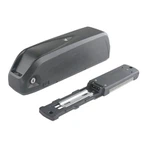When choosing the right battery for your electric bike, the decision often comes down to two popular options: the 60V 20Ah and the 48V 30Ah battery. Both offer distinct benefits depending on your riding needs. In this guide, we'll compare these battery types in terms of top speeds, battery charge, watt hours (Wh), and more, to help you determine which battery is the best fit for your electric bike.

Understanding Battery Specifications
Before diving into the pros and cons of 60V 20Ah vs. 48V 30Ah batteries, it's essential to understand the basic terms used to describe electric bike batteries.
Voltage (V): This determines how much extra power the battery can provide to the motor. A higher voltage battery like 60V will generally deliver more power and allow for higher speeds, while a 48V battery is a bit less powerful but still provides enough power for typical electric bike performance.
Amp-Hour (Ah): The amp-hour rating tells you the capacity of the battery. A 20Ah battery stores less energy than a 30Ah battery, meaning the larger 48V 30Ah battery can typically give you a longer range before requiring a full charge.
60V 20Ah vs. 48V 30Ah Battery: Power and Performance
Top Speeds and Power
- 60V 20Ah: Due to the higher voltage, a 60V 20Ah battery can offer higher speeds and better acceleration, especially on hilly terrain. This battery is ideal for riders who prioritize performance and extra power during acceleration or for climbing steep inclines.
- 48V 30Ah: While the 48V battery offers less raw power compared to the 60V 20Ah, it is still capable of achieving higher speeds and providing a smooth ride on moderate terrain. The 30Ah capacity ensures that you get a good range, even at higher speeds.
Watt Hours (Wh) Comparison
To understand the total energy capacity of each battery, we need to look at watt hours (Wh), which is a combination of voltage and capacity.
- 60V 20Ah: 60V * 20Ah = 1200Wh
- 48V 30Ah: 48V * 30Ah = 1440Wh
This means that although the 60V 20Ah provides more power, the 48V 30Ah has a larger total energy capacity, offering a longer range on a full charge.
Range and Battery Charge
Range is one of the most crucial factors when choosing between these two batteries.
- 60V 20Ah: The 60V 20Ah battery provides higher voltage, which is great for higher speeds but may drain quicker, especially on longer rides. It's a better choice if you frequently ride on steep hills or need a bike that accelerates quickly.
- 48V 30Ah: With its larger capacity of 30Ah, the 48V 30Ah battery can keep your bike running for longer periods. This makes it ideal for riders who want to cover more distance on a single charge, especially on flatter terrain or if you need to upgrade to a battery with longer-lasting power.
Weight and Handling
Another consideration is how the battery's size impacts your ride.
- 60V 20Ah: This battery is generally lighter due to its lower capacity. The higher voltage means you get more power per unit of weight, making it a great option for riders who want a nimble bike.
- 48V 30Ah: The bigger battery size of the 48V 30Ah makes it heavier, which could slightly affect the handling of your electric bike. However, this tradeoff provides you with more watt hours (Wh), which is beneficial for long-distance riders.
Cost and Longevity
Battery price is often a deciding factor for many riders.
- 48V 30Ah batteries tend to be more affordable compared to their 60V 20Ah counterparts, despite offering similar or even better range.
- In terms of battery life, both types can last a long time if properly maintained. However, due to its larger capacity, the 48V 30Ah battery is often a more cost-effective option in the long run, especially if your riding style doesn't require extreme power.

Why Choose GEB's Lithium Battery Packs?
At GEB, we specialize in lithium battery packs for electric bikes, and our products are known for their reliability and performance. Whether you're looking for a 48V 20Ah battery for smooth commutes or a 60V 20Ah for higher-speed adventures, GEB offers a wide range of batteries to suit your needs.
Our batteries are crafted to maximize both performance and range, with a focus on long-term durability. As a non-government-backed company, we pride ourselves on providing personalized service and custom solutions for both large and small projects. Our team is always available to help you choose the perfect battery type for your electric bike.

Conclusion
The decision between a 60V 20Ah and a 48V 30Ah battery ultimately depends on your personal riding preferences:
If you want more power and higher speeds, especially for climbing hills or achieving quick acceleration, the 60V 20Ah battery may be the better choice.
If you need a longer range and are more focused on comfortable, efficient riding with fewer stops to battery charge, the 48V 30Ah is likely a more practical option.
Regardless of your choice, GEB's lithium battery packs offer top-tier performance and long-lasting reliability. If you're ready to upgrade your electric bike, feel free to reach out to us for the best battery solutions for your needs.(sales@gebattery.co)









